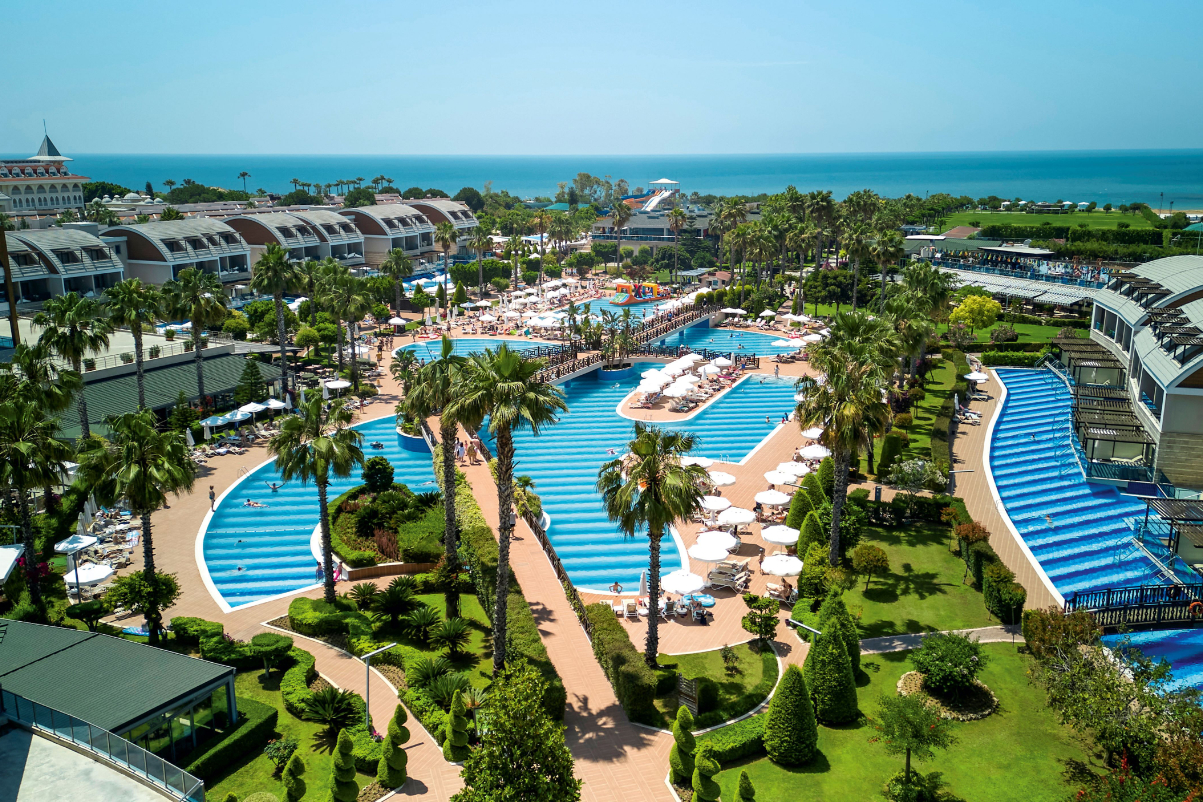The new thing in the Dubai development boom: Hotel apartments

Skift Take
It took Damac Properties Co. one day to sell the first 200 units in its Hollywood-themed apartment and hotel project as buyers seized the opportunity to invest in Dubai’s booming tourism market.
The closely held company, working with Viacom Inc.’s Paramount Pictures, plans to finance the $1 billion, four-tower development in part with proceeds from advance sales of serviced apartments. Buyers of serviced apartments, so-called because the hotel operator provides services including house cleaning, bed- making and Wi-Fi, can rent them out through a central reservation system, with annual yields that can exceed those from conventional apartment buildings.
“Rents can reach double what you’ll normally get on a long-term lease,” said Ronald Hinchey, United Arab Emirates director at Cluttons LLP, a property management and consulting firm. “It’s a very good investment, simply because hotel occupancy and rates are very high at the moment.”
The depth of demand for serviced apartments -- and their viability as a financing source for developers at a time when construction loans are hard to get -- will be tested as Damac and Emaar Properties PSJC, the country’s biggest developer, seek to sell at least 2,400 units over the coming months.
Until now, individual investors have been largely excluded from Dubai’s hospitality market, where the vast majority of rooms and serviced apartments are owned by private funds and hotel operators. An increase in tourism and shopping starting in 2010 is sparking a surge in accommodation and leisure projects.
Additional Rooms
It remains to be seen whether tourism will be strong enough to sustain the surge in Dubai’s hotel development. At least 11,200 rooms are expected to be added in Dubai by 2015 as hotels such as Sofitel Palm Jumeirah, Anantara Royal Amwaj and Oberoi Business Bay are completed, broker Jones Lang LaSalle Inc. said in a report last month. The sheikhdom is still recovering from a speculation-driven real estate crash that caused property values to fall more than 65 percent.
Damac purchased land and began work on the Damac Towers by Paramount project this year and plans to sell 1,000 apartments to fund construction. The company said it expects rental yields, annual income as a proportion of the purchase price and costs, to be at least 50 percent higher than conventional apartments. That’s 12 percent for luxury serviced apartments and 15 percent for those associated with a well-known hospitality or retail brand. Damac didn’t provide details about its second round of apartment sales, which began last month.
Biggest Mall
Emaar in September started selling properties in its first serviced-apartment tower since 2008. The Address The BLVD, linked to the world’s biggest mall, will include 542 serviced apartments and 200 hotel rooms. That building and other projects, including two towers connected by a roof terrace, will add about 1,400 serviced apartments to the existing 1,700 already built by the Dubai developer.
Dubai’s hotel and retail markets are recovering more quickly than office properties and homes as political turmoil in the Middle East steers visitors toward the U.A.E., one of the region’s most stable and accessible countries.
Hotel occupancy has averaged 88 percent this year, among the highest in the world, even as 500 rooms were added, according to Jones Lang. Revenue per available room, a measure of occupancy and rates, climbed 9 percent in the first quarter and average room rates rose 5 percent. The number of guests at Dubai hotels increased 9.5 percent last year to 9.96 million, with the majority coming from the Gulf states, India and Europe, according to data compiled by the Department of Tourism and Commerce Marketing.
Overbuilding Homes
Most individual investors in Dubai purchased residential properties for rental or resale, with thousands losing out when values plummeted as developers continued to build properties even as demand evaporated.
Private apartments produce rental yields of 6 percent to 9 percent, according to Craig Plumb, head of Middle East research for Jones Lang. A rental yield of 20 percent is achievable for serviced apartments, though only at the best-run places with large networks and strong brands, Hinchey said. Buyers also benefit when hotel operators pool the earnings of the privately owned apartments.
“So even if they don’t let your apartments, you’ll still get some revenue,” he said. “That isn’t a problem now because occupancy levels in some hotel apartments are in the high 90s.”
As a rule, buyers make a down payment of 10 percent of the total price, followed by several more payments during the building’s construction. They also pay maintenance fees as well as giving the operator a share of any profit they make from renting the apartment out.
High Returns
Emaar, which has sold serviced apartments in hotels around the Burj Khalifa, the world’s tallest tower, offers investors the opportunity to pool their rental properties. The grouped apartments are generating higher returns than other serviced residences in Downtown Dubai, the company said without being more specific. Serviced apartments leased for a year can generate rental income of as much as 8 percent, said Philip Wooller, Middle East and Africa director at hotel-research firm STR Global.
London is a leading market for serviced apartments, with properties offered in the Mandarin Oriental Hotel, the Shard skyscraper and the under-construction Four Seasons Hotel on Heron Plaza, broker Knight Frank LLP said in a report. “I can certainly see it spreading throughout emerging locations in Southeast Asia, South America and India,” Stephan Miles-Brown, Knight Frank’s head of residential development, said in the report.
Raising Money
Dubai’s developers are seeking individual buyers as bank lending for projects remains tight, even for hotel and retail properties. The companies are seeking alternatives including bond and share sales to finance projects.
The serviced apartments by Damac and Emaar mark a return of so-called off-plan sales, where advance payments on purchases help finance construction. While that provides developers with a way to fund projects, it also revives a practice that dried up after playing a central role in the Dubai property bubble that burst in 2008.
Banks in Dubai largely stopped financing off-plan property purchases after the market crashed, meaning investors will have to dip into their own resources to pay developers in installments as construction progresses, Ziad El Chaar, Damac’s managing director said in an interview. Buyers in the company’s hotel project paid 10 percent up front.
Saudi Visitors
Hotel apartments make up a minority of the hospitality market in Dubai, allowing room for growth even if overall tourism slows. The rooms are popular with Saudis, who made up the largest number of Dubai’s visitors last year.
Revenue generated by hotel apartments grew 21 percent to 2.8 billion dirhams ($762 million) last year from 2011 and supply grew by 9.8 percent to 23,069, according to DTCM. Traditional hotel rooms had a 17 percent revenue gain and an increase in supply of 6.5 percent to 57,345 rooms.
Hotel apartments in Dubai are generally alcohol free, an arrangement preferred by observant Muslim guests. At least 1.13 million people visited Dubai from Saudi Arabia last year, DTCM estimates.
“Dubai has an eclectic mix which is why it’s so strong,” said Wooller of STR Global. “Beach properties get the Russian, German and British demand, while downtown gets a lot of the Gulf, Chinese, Korean, Asia-Pacific market. Deira and Bur Dubai are more business and there you get a lot of Indian traffic into the cheaper hotels.”
Lower Rates
The property slump hit all of Dubai’s markets, including hotels. Room rates dropped at least 50 percent from 2008 before recovering by about 10 percent, Cluttons’ Hinchey said.
“Hospitality needed to become affordable to become successful, and before 2008 the room rates were too high,” he said. “Although the hospitality industry is doing well in terms of occupancy now, the room rates are well below what they were.”
As long as occupancy rates remain high, apartment hotels will provide property companies with financing for building even if other sources dry up, Wooller of STR Global said.
“You can barely buy a room in Dubai,” he said “As money becomes harder to find, hotel investment becomes a good way to develop a financial foundation for any development.”
With assistance from Neil Callanan in London. Editors: Ross Larsen and Andrew Blackman.
To contact the reporter on this story: Zainab Fattah in Dubai on zfattah@bloomberg.net. To contact the editor responsible for this story: Andrew Blackman at ablackman@bloomberg.net. ![]()




